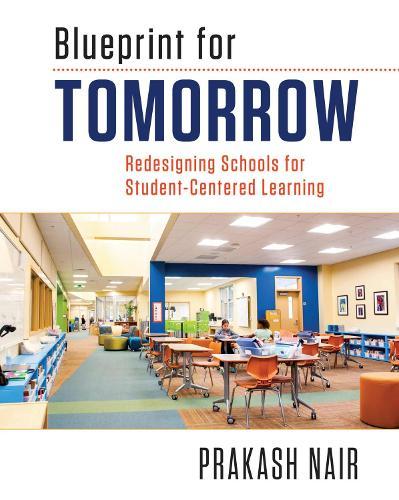Overview
The United States has about $10.5 trillion tied up in aging school facilities. School districts throughout the country spend about $30 billion every year keeping this infrastructure going. Yet almost all of the new money we pour into school facilities reinforces an existing - and obsolete - model of schooling. In Blueprint for Tomorrow, Prakash Nair - one of the world’s leading school designers - explores the hidden messages that our school facilities and classrooms convey and advocates for the “alignment” of the design of places in which we teach and learn with twenty-first-century learning goals. Blueprint for Tomorrow provides simple, affordable, and versatile ideas for adapting or redesigning school spaces to support student-centered learning. In particular, the author focuses on ways to use current spending to modify existing spaces, and explains which kinds of adaptations offer the biggest return in terms of student learning. The book is organized by area - from classrooms to cafeterias - and is richly illustrated throughout, including “before and after” features, “smart idea” sidebars, and “do now” suggestions for practical first steps. It outlines key principles for designing spaces that support today’s learning needs and includes tools to help educators evaluate the educational effectiveness of their own spaces. Blueprint for Tomorrow will open educators’ eyes to the ways that architecture and learning are entwined and will challenge them to rethink the ways they teach and work together.
Full Product Details
Author: Prakash Nair
Publisher: Harvard Educational Publishing Group
Imprint: Harvard Educational Publishing Group
Dimensions:
Width: 18.70cm
, Height: 1.20cm
, Length: 23.30cm
Weight: 0.450kg
ISBN: 9781612507040
ISBN 10: 1612507042
Pages: 216
Publication Date: 30 September 2014
Audience:
College/higher education
,
Professional and scholarly
,
Postgraduate, Research & Scholarly
,
Professional & Vocational
Format: Paperback
Publisher's Status: Active
Availability: In Print

This item will be ordered in for you from one of our suppliers. Upon receipt, we will promptly dispatch it out to you. For in store availability, please contact us.
Reviews
This book will be a welcome addition to the library of any school administrator who wants to look beyond standardized testing and prescribed curricula for ways to improve learning. Teachers will be enthused by the emphasis on removing barriers to learning that inhibit their efforts. Parents will notice and welcome the improvements. And, most importantly, students will be stimulated by their new environment and motivated to expand their learning. --John C. Fagan, School Administrator
This book will be a welcome addition to the library of any school administrator who wants to look beyond standardized testing and prescribed curricula for ways to improve learning. Teachers will be enthused by the emphasis on removing barriers to learning that inhibit their efforts. Parents will notice and welcome the improvements. And, most importantly, students will be stimulated by their new environment and motivated to expand their learning. <b>--John C. Fagan</b>, <i>School Administrator</i>
This book will be a welcome addition to the library of any school administrator who wants to look beyond standardized testing and prescribed curricula for ways to improve learning. Teachers will be enthused by the emphasis on removing barriers to learning that inhibit their efforts. Parents will notice and welcome the improvements. And, most importantly, students will be stimulated by their new environment and motivated to expand their learning. --John C. Fagan, School Administrator His intriguing and informative book Blueprint for Tomorrow: Redesigning Schools for Student-Centered Learning successfully proves that the effective use of space is of paramount importance and needs to be prioritized...Regardless of a school's budget for renovation, this is a book all educators need to familiarize themselves with. --Matthew Pariselli, Green Teacher Nair gives a Blueprint for Tomorrow, thoroughly explaining how today's education dollars can be spent for tomorrow's success. --Jackie Craven, ThoughtCo.
Author Information
Prakash Nair is the founding president of Fielding Nair International, an award-winning school planning and design firm with consultations in thirty-eight countries. Prior to establishing Fielding Nair International, Nair worked as the director of operations for the world’s largest school construction program in New York City, USA.




